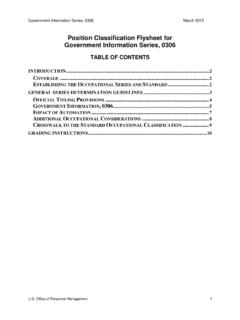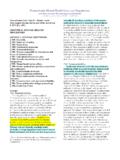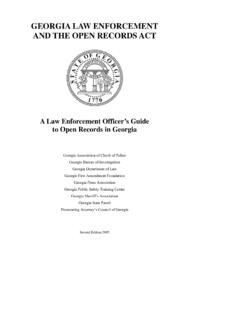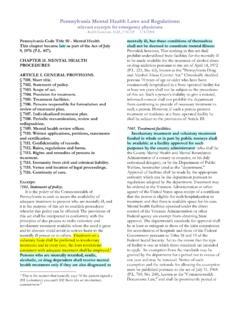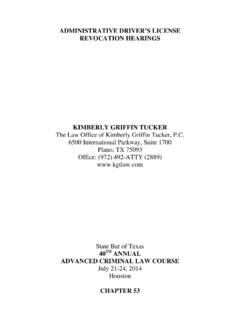Transcription of Grade Evaluation Guide for Police and Security Guard ...
1 Grade Evaluation Guide for Police and Security Guard Positions in Series, GS-0083/GS-0085 TS-87 April 1988 Grade Evaluation Guide for Police and Security Guard Positions in Series, GS-0083, GS-0085 Table of Contents Police Security Guard OCCUPATIONAL NATURE OF Police NATURE OF Security Guard SERIES Grade Grade CONVERSION FACTOR LEVEL FACTOR 1, KNOWLEDGE REQUIRED BY THE FACTOR 2, SUPERVISORY FACTOR 3, FACTOR 4, FACTOR 5, SCOPE AND FACTOR 6, PERSONAL FACTOR 7, PURPOSE OF FACTOR 8, PHYSICAL FACTOR 9, WORK Office of Personnel Management 1 Grade Evaluation Guide for Police and Security Guard Positions in Series, GS-0083/GS-0085 TS-87 April 1988 Police SERIES This series includes positions the primary duties of which are the performance or supervision of law enforcement work in the preservation of the peace; the prevention, detection, and investigation of crimes; the arrest or apprehension of violators; and the provision of assistance to citizens in emergency situations, including the protection of civil rights.
2 The purpose of Police work is to assure compliance with Federal, State, county, and municipal laws and ordinances, and agency rules and regulations pertaining to law enforcement work. (See Digest 4 for guidance on distinguishing between GS-1811 and GS-0083 series; See Digest 8 for guidance on distinguishing between GS-0083 and GS-0085 series) Security Guard SERIES This series includes positions the primary duties of which are the performance or supervision of protective services work in guarding Federally owned or leased buildings and property; protecting Government equipment and material; and controlling access to Federal installations by employees, visitors, residents, and patients.
3 The purpose of Security Guard work is to protect and prevent loss of materials or processes which are important for national defense, for public health or safety, or as national treasures.(See Digest 8 for guidance on distinguishing between GS-083 and GS-085 series) This Guide supersedes the standards for the Police Series, GS-0083, issued in August 1974 and the Guard Series, GS-0085, issued in June 1968. EXCLUSIONS 1. Positions primarily responsible for investigating alleged or suspected major offenses or violations of specialized laws of the United States are classified to the Criminal Investigating Series, GS-1811. 2. Positions primarily responsible for work in serving judicial processes or writs issued under authority of the United States, executing warrants, making arrests, safeguarding and transporting prisoners, maintaining order, pursuing and apprehending fugitives from justice, and performing such other duties as are directed by a Federal court are classified to the United States Marshal Series, GS-0082.
4 3. Positions primarily responsible for work involving direct custodial care and supervision of inmates of penal institutions, when the paramount qualification requirement is knowledge of and skill in applying correctional techniques, are classified to the Correctional Officer Series, GS-0007. 4. Positions primarily responsible for the administration, supervision, direction, coordination, and control of Security programs are classified to the Security Administration Series, GS-0080. Office of Personnel Management 2 Grade Evaluation Guide for Police and Security Guard Positions in Series, GS-0083/GS-0085 TS-87 April 1988 5. Positions primarily responsible for the protection, movement, and delivery of sensitive nuclear materials are classified to the Nuclear Materials Courier Series, GS-0084.
5 6. Positions primarily responsible for the detention and safeguarding of aliens involved in immigration or deportation proceedings are classified to an appropriate general series (e. g., Compliance Inspection and Support Series, GS-1802). OCCUPATIONAL INFORMATION Federal Police and Security Guard work ranges from fairly passive to very active involvement in law enforcement and protective activities. In some jurisdictions, there is a high potential for minor and serious violations, including some incidence of felonies, while in other locations, even misdemeanors are not very common except for traffic violations. The primary mission and purpose of Police organizations is to enforce law, maintain law and order, preserve the peace, and protect the life and civil rights of persons.
6 The primary mission and purpose of Security Guard organizations is to protect and prevent unauthorized access to Federal property because it contains processes or materials that are sensitive or valuable from a national defense, public treasure, public health, or public safety point of view. Police are typically trained to deal with misdemeanors and felonies, which can range from petty theft and verbal assault through murder, rape, simple and aggravated assault, domestic disputes, kidnapping, hostage taking, theft of national defense information and materials, theft of office equipment, drug trafficking, assault on Government facilities, arson and bomb threats, crowd control, and other conditions involving violations of law and threats to human life.
7 Security guards are trained more in the methods and techniques for detecting and repelling attempts at trespass, sabotage, and theft of property. Typically, Security guards prevent, respond to, and/or resist attempted violations, apprehend and detain offenders, and turn over cases and violators to Police or other law enforcement officers. As required by 5 3310 and 5 CFR , Guard positions are restricted to preference eligibles. Nonveterans may be appointed to Guard positions only if no qualified preference eligibles are available or through certain noncompetitive actions or temporary appointment. There are no such restrictions for appointment to Police officer positions. In some instances, the distinction between Police and Guard work may not be an easy one to make, because of the similarities between the two kinds of work.
8 Employees in both series may be uniformed, armed, trained to respond to all possible situations, referred to or addressed as "officer," and subject to substantial hazard or danger in emergencies. It is necessary, however, to make a determination as to whether a position covered by this Guide is a Police officer or a Security Guard . This determination is needed to assure compliance with veterans preference requirements and proper application of this Guide for titling and grading purposes according to assigned duties and responsibilities. The following information is intended to help in making this determination. Office of Personnel Management 3 Grade Evaluation Guide for Police and Security Guard Positions in Series, GS-0083/GS-0085 TS-87 April 1988 NATURE OF Police WORK The primary mission of Police officers in the Federal service is to maintain law and order.
9 In carrying out this mission, Police officers protect life, property, and the civil rights of individuals. They prevent, detect, and investigate violations of laws, rules, and regulations involving accidents, crimes, and misconduct involving misdemeanors and felonies. They arrest violators, assist in the prosecution of criminals, and serve as a source of assistance to persons in emergency situations. Police services are provided in Federal residential areas, parks, reservations, roads and highways, commercial and industrial areas, military installations, Federally owned and leased office buildings, and similar facilities under Federal control. Within their jurisdictions, Police officers enforce a wide variety of Federal, State, county, and municipal laws and ordinances, and agency rules and regulations relating to law enforcement.
10 They must be cognizant of the rights of suspects, the laws of search and seizure, constraints on the use of force (including deadly force), and the civil rights of individuals. Police officers are commissioned, deputized, appointed, or otherwise designated as agency and/or local law enforcement officers by statute, delegation, or deputization by local governments, or other official act. Arrest and apprehension authority includes the power to formally detain and incarcerate individuals pending the completion of formal charges (booking); requesting and serving warrants for search, seizure, and arrest; testifying at hearings to establish and collect collateral (bond); and/or participating in trials to determine innocence or guilt.









